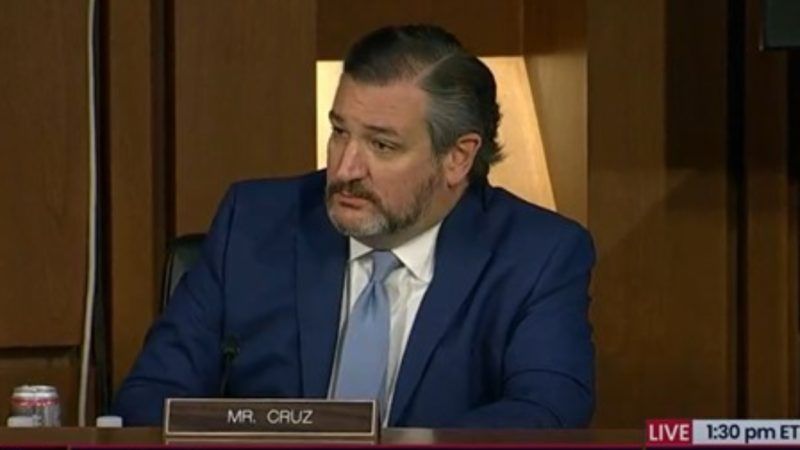Defending Amy Coney Barrett, Ted Cruz Highlights the Threats That Democrats Pose to Civil Liberties
The Texas senator notes the opposing party's blind spots on freedom of speech and the right to arms.

Senate Democrats are portraying Supreme Court nominee Amy Coney Barrett as a menace to health care, abortion access, and democracy. During Barrett's confirmation hearing today, Sen. Ted Cruz (R–Texas) countered that argument by detailing some of the ways in which justices nominated by a Democratic president could be expected to endanger civil liberties—in particular, freedom of speech and the right to armed self-defense.
When Hillary Clinton ran for president in 2016, Cruz noted, she promised to nominate justices who would vote to overturn Citizens United v. Federal Election Commission, the 2010 decision in which the Supreme Court concluded that restrictions on political speech by labor unions and corporations, including an ideologically diverse array of nonprofit advocacy groups, were inconsistent with the First Amendment. The issue in that case, Cruz reminded us, was whether "a small nonprofit organization based in D.C." could be fined for airing and promoting "a movie critical of a politician"—Clinton herself—close to an election, which qualified as a forbidden "electioneering communication."
During the first round of oral argument in Citizens United, Cruz noted, Justice Samuel Alito asked Deputy Solicitor General Malcolm Stewart whether the Constitution would allow Congress to ban material like Hillary: The Movie not just on radio or TV but in other media as well, such as DVDs, the internet, and books. Stewart said yes, noting that the ban on "express advocacy" by corporations—speech that does not merely praise or pan a candidate but explicitly supports his election or defeat—was not limited to radio and TV.
"That's pretty incredible," Alito replied. He then pressed Stewart to say whether a book containing express advocacy could be banned if it were published by a corporation (as books typically are). After much hemming and hawing, Stewart again said yes. He did note that the ban on express advocacy made an exception for media corporations such as book publishers, without committing himself on whether such an exception was constitutionally required.
That exchange was "truly chilling," Cruz said, since it reflected "a terrifying view of the First Amendment." The book-banning claim also startled Justice Antonin Scalia. "I'm a little disoriented here, Mr. Stewart," he said. "We are dealing with a constitutional provision, are we not, the one that I remember which says Congress shall make no law abridging the freedom of the press? That's what we're interpreting here?"
The discussion of book bans was a turning point in the case. By exposing the breadth of the censorship power claimed by the government, it spurred the justices to schedule a highly unusual second round of oral arguments to consider whether a 1990 precedent upholding a state ban on express advocacy should be revisited. The ultimate result was a 5-4 decision that overturned the rule against express advocacy as well as the restrictions on electioneering communications.
Given the closeness of that vote, Clinton's promise to nominate justices hostile to Citizens United could have had serious consequences for freedom of speech, and not in a good way. Joe Biden, who supports a constitutional amendment that would not only "end Citizens United" but "prevent outside spending from distorting the election process," seems to take an even narrower view of what Americans should be allowed to say about politicians like him.
In addition to supporting restrictions on political speech, Cruz noted, Democrats have a blind spot when it comes to the Second Amendment. While Democrats talk about "reasonable gun control," he said, that "is not what was at stake" in District of Columbia v. Heller, the 2008 decision in which the Supreme Court, also by a 5-4 vote, overturned a D.C. law that banned handguns outright and effectively made it illegal to use even long guns in defense of one's home and family. "The position of the four dissenters"—all but one nominated by Democrats—"was that the Second Amendment does not provide for any individual right to keep and bear arms whatsoever," Cruz pointed out, meaning it imposes no restrictions at all on gun laws.
The Democratic platform, which this year talks a lot about gun control but does not even pay lip service to the Second Amendment, likewise seems to view it as a nullity. The implication of that view, Cruz observed, is that "the federal government, the state government, [or] the city could ban guns entirely, could make it a criminal offense for any one of us to own a firearm, and no individual would have any judicially cognizable right to challenge that. That is a radical reading of the Constitution. That is effectively erasing the Second Amendment from the Bill of Rights."
The point is not that Republicans are generally sounder on civil liberties than Democrats. Even when it comes to freedom of speech, Cruz himself is an unreliable ally who recently suggested that a movie he did not like should be banned.
Nor is the point that Republican Supreme Court nominees will always be safer bets for people who want the entire Bill of Rights to be respected. A Republican nominee might be a staunch defender of the Second Amendment (as Barrett clearly is) but less reliable when it comes to, say, due process or the Fourth Amendment (although Barrett looks pretty good on both counts).
The point is that, contrary to what Democrats want us to believe, threats to civil liberties do not emanate exclusively from either major party, and neither does concern about them.
[This post has been corrected to note that one of the Heller dissenters was appointed by a Republican.]

Show Comments (128)